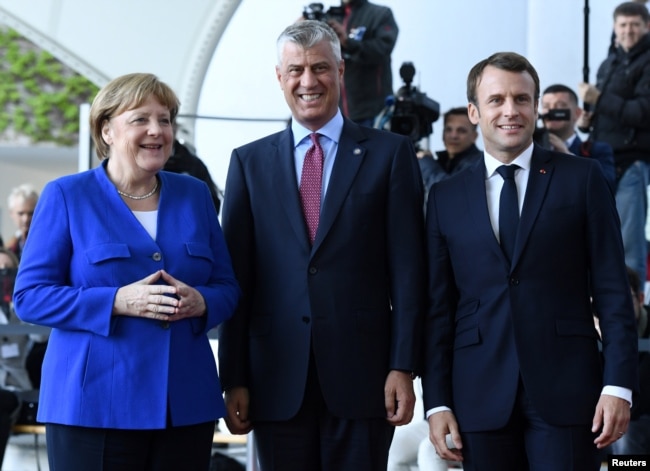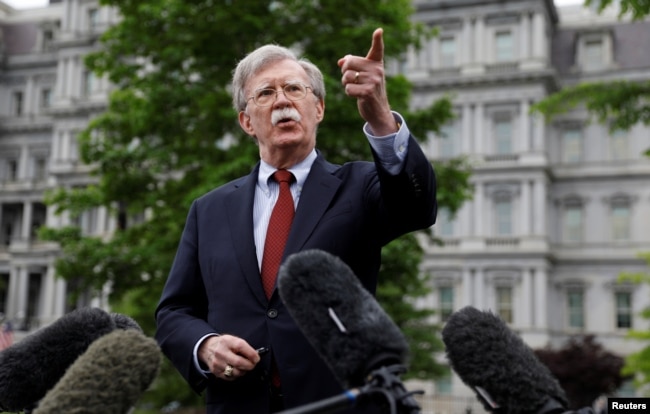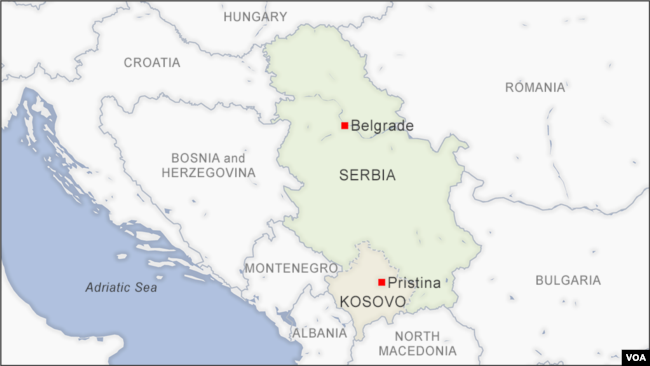A White House deputy national security advisor says Kosovo’s excessively high tax on goods from Serbia precludes direct U.S. involvement in normalization talks, which President Donald Trump has been pushing for since December, VOA news reports.
The EU-mediated dialogue between Pristina and Belgrade, which started in 2011, broke down last fall over a proposed land swap and Kosovo’s levy of a 100-percent tax on imports from Serbia and Bosnia-Herzegovina.
Last month, Kosovar President Hashim Thaci said Washington must have a “leading role” in the process of normalizing relations with Serbia because the European Union is too “weak” and “not united.”
But John Erath, deputy senior director for European Affairs on the U.S. National Security Council, says that’s a non-starter unless Pristina suspends or kills the tariff to lure Belgrade back to the negotiating table.
“We’ve heard that it’s important for the U.S. to be involved in the dialogue, to play some kind of facilitating role, but we can’t do this until there’s an actual dialogue—that is, until the tariff goes away,” he told VOA’s Albanian Service.
“I sit in my office and I have plans for how I can help and what the U.S. contribution can be, and I can’t start to implement them until we get past the question of the tariff,” said Erath.
‘Territorial adjustments’
White House National Security Adviser John Bolton raised eyebrows last fall when he broke from a long-held U.S. position on the issue by stating that the United States would not be bothered if Serbia and Kosovo agreed to “territorial adjustments.”
Also known as land swaps or border corrections, territorial adjustments are politically sacrilege to EU leaders and most regional experts involved in normalization talks. They’ve described them as a form of “peaceful ethnic cleansing” that risks reigniting border quarrels in other politically fragile parts of the region and reopening wounds from the Balkan wars of the 1990s.
Erath, however, said Bolton’s statement doesn’t contradict Western messaging on the issue.
“Our position, very simply put, is that anything agreed between the two parties would be fine with us,” he said. “Our goal is to see an agreement and see normalized relations. The Germans emphasize that a little bit differently. But in effect, it is the same thing, because … I don’t see any practical way that you could work out a large territorial change that would be acceptable to both parties.
“The U.S. upholds the OSCE principles, including territorial integrity, and it is for the people in Kosovo to decide what is the question of their territorial integrity,” he added, largely echoing statements recently made by Matthew Palmer, deputy assistant secretary for European and Eurasian affairs at the U.S. State Department.
“This is all just a rehash,” he added. “We went through this back in 2007 in the Ahtisaari process, where some of the so-called experts were proposing partitions and things like that. It was nonsense then and it’s nonsense now. There can be no partition.”
Retired U.S. Ambassador Frank Wisner, who served as the U.S. special envoy to U.N.-backed talks that led to Kosovo’s declaration of independence, agreed.
“I don’t think any of us on the outside should second guess the Serbians or the Kosovars in their trying to resolve the issues that divide them, and if they want to do it with some territorial adjustment that’s fine, but I don’t think it’s going to happen,” he told VOA, calling it logistically unrealistic.
“There’s insufficient public support inside Kosovo, insufficient political support,” he said. “And inside Serbia, without some measure of progress, [citizens] are not going to buy a territorial solution, so I don’t see a way forward.”
Twenty years on
June 10 marks 20 years since the cessation of violence in the region, when then-President Bill Clinton announced the 78-day U.S.-led NATO bombing campaign against Serbia concluded.
Reflecting on the intervening two decades, Wisner said current EU-led negotiations should proceed “in the lowest-key possible fashion,” with much greater public emphasis on financial support and foreign investment.
“While of course there will be continuing negotiations, there won’t be an easy or early answer to those negotiations,” he said. “Rather, the obligation falls principally on the European Union to invest in the region and to increase its efforts to bring the region into Europe—to increase road connections, electricity, internet connectivity, and economic activity of a wide variety.”
Political solutions alone, he explained, are too easily derailed by regional actors.
“That was the case inside Kosovo, and it’s been the case in Bosnia where local political realities overcame the best intention of external negotiators,” he said.
Majority-Albanian Kosovo declared independence from Serbia in 2008, almost a decade after NATO airstrikes ended Belgrade’s control of the territory following a brutal counter-insurgency there by Serbian security forces.
But Serbia, whose constitution still sees Kosovo as Serb territory and the cradle of their Orthodox Christian faith, has been blocking Kosovo from joining international institutions such as Interpol and UNESCO, and still provides financial aid to ethnic Serbs in Kosovo.
Both Kosovo and Serbia aspire to join the EU, which has made the normalization of relations a precondition for membership.
Both sides hopeful
Serbian President Aleksandr Vucic has repeatedly said revoking the 100-percent tariff is Belgrade’s only requirement for resuming talks, while Kosovar officials have demanded that Serbia first recognize Kosovo’s independence.
Although more than 110 countries recognize Kosovo, Serbia, Bosnia, Russia, China and five European Union countries, remain opposed to its independence.
Tensions in the region spiked last week when Kosovar police raided Serb-populated areas in what officials called a crackdown on organized crime. Serbia’s president responded by putting its border troops on full alert. Only a day before, he’d told Serbian lawmakers the country had to accept that it had forever lost control of Kosovo.
Speaking at an event in Slovakia on Friday, Vucic told reporters that despite his pessimism about prospects for a breakthrough in negotiations, “both sides must keep seeking a compromise.”
Kosovo’s president expressed hope while speaking at the same event about reaching a normalization deal with Serbia this year, and that a planned meeting on July 1 in Paris might prove a turning point.
“I hope so,” he told reporters. “If not, we will lose a decade.”



